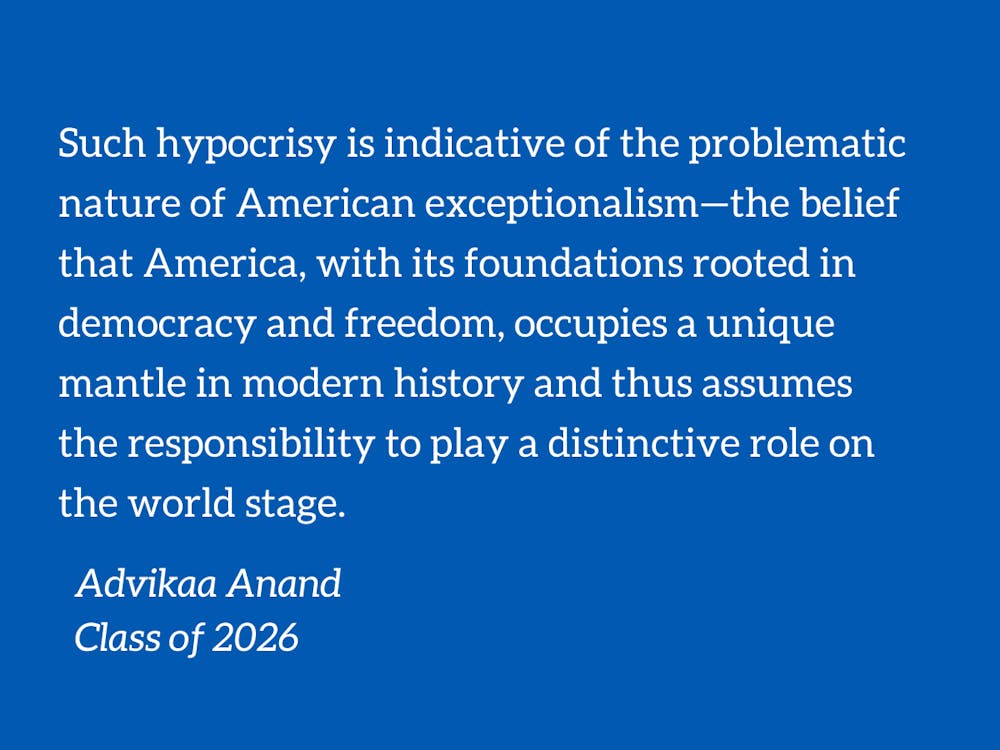On each anniversary of 9/11, a grave sobriety seems to overcome every classroom. There is a tension suspended in the air, bolstered by the realization that the event forever altered the course of our country’s history. Amid it all appears to be the tacit understanding that our sense of grief has been woven into our cultural fabric as Americans: our collective despair was the kind that can only be experienced once across the span of memory, and for us Americans, that unique anguish was borne from that moment.
2,996 innocent people had died.
2,996 innocent Americans had died.
But as we mourn the loss of these Americans each year, we forget the 70,000 innocent Afghan and Pakistani civilians that our nation has slaughtered in the name of those 2,996 Americans, waging an aimless war that has caused unprecedented displacement and destruction. Indeed, the United States is a global protector of peace, prosperity, and life, but only when those virtues are tantamount to the preservation of the lives its leaders appear to value. And the lives of these Afghan and Pakistani civilians appear to matter even less because they are far removed from the American mainland, sinking into a distant narrative that the average American can forget.
Such hypocrisy is indicative of the problematic nature of American exceptionalism—the belief that America, with its foundations rooted in democracy and freedom, occupies a unique mantle in modern history and thus assumes the responsibility to play a distinctive role on the world stage. The idea is not shaped by any empirical observations of America’s particular ability to quash international quarrels and promote world peace; instead, it takes its origins in a term coined by John Winthrop, governor of the province Massachusetts Bay, as he envisioned an extraordinary future for his people: “We shall be as a city upon a hill. The eyes of all people upon us.” And so the notion that the United States is an elect nation, and its citizens an elect people, was conceived.
This “city on a hill syndrome” has become interwoven with American culture, symbolic of a national desire for constant progress. And certainly, it has birthed the sense of optimism that cultivates our daring, propelling us towards landing on the moon and soaring into the skies, all for the first time as we discovered our own version of infinity and beyond.
But this confidence also engenders a form of modern imperialism, an excuse for American hegemonic control even when intervention does citizens of other nations more harm than good and one that enjoys moderate support from American citizens. Surveys from the Pew Research Center have revealed that Americans are more likely to display patriotism in comparison with Western Europeans. In fact, “the ordinary citizen [appears to have] a modest appetite for spreading American ideals.” Many Americans also seem to function on the automatic supposition that since the American way is so great, others must also want to be like them.
The “city on a hill syndrome” not only pervades our national culture and identity; it also seeps into our educational systems. Such is visible in the passionate calls of flawed patriots to teach the “real” version of American history, glossing over the humanitarian atrocities perpetrated by the United States in various parts of the world. The indoctrination of this belief was further translated into legislation with former president Donald Trump’s “President’s Advisory 1776 Commission,” “claiming that it would be his and the GOP’s goal to teach American exceptionalism in classrooms with the hopes of restoring patriotic education.”
Although I studied AP US History in high school, a curriculum endorsed by the accredited College Board, my textbook was suffused only with abstract claims of “liberty” and “freedom.” It was only while taking a global politics class here at Duke that I became acquainted with American transgressions in Guantanamo Bay and our flagrant breaches of the Geneva Convention. As I began to parse that America was guilty of war crimes, I felt a wave of immediate guilt because my education system had associated the term only with foreign entities. Governmental abuse of citizens was the norm, and like always, America was the glorious exception to this rule.
When persuasion becomes the goal of our education systems, they produce a lack of willingness to hold the United States accountable for its actions and acknowledge its wrongdoing, portraying racial trauma as a mere blemish and misstep in the grand scheme of American history and ultimately trivializing the nation’s grave misdeeds for the sake of patriotism. Eventually, they beget the dangerously dismissive attitude characterizing so many Americans today, who mistakenly claim that those national sins rest in old history and believe that we have no responsibility to repair the broken past we inherit.
The fault is our own. We erroneously believe that patriotism is collinear with abstinence from criticism. We castigate residents who dare to criticize our nation, telling them to leave if they are so discontent.
But we need only to think back to our ordinance to “build a more perfect union in order to realize that an inherent component of being an American is acknowledging that we can always chase a brighter future, that we can never rest in the pursuit of progress, and most importantly, that being American is not being unblemished but simply unfinished.
Get The Chronicle straight to your inbox
Sign up for our weekly newsletter. Cancel at any time.
Advikaa Anand is a Trinity sophomore and an opinion managing editor of The Chronicle's 119th volume.

